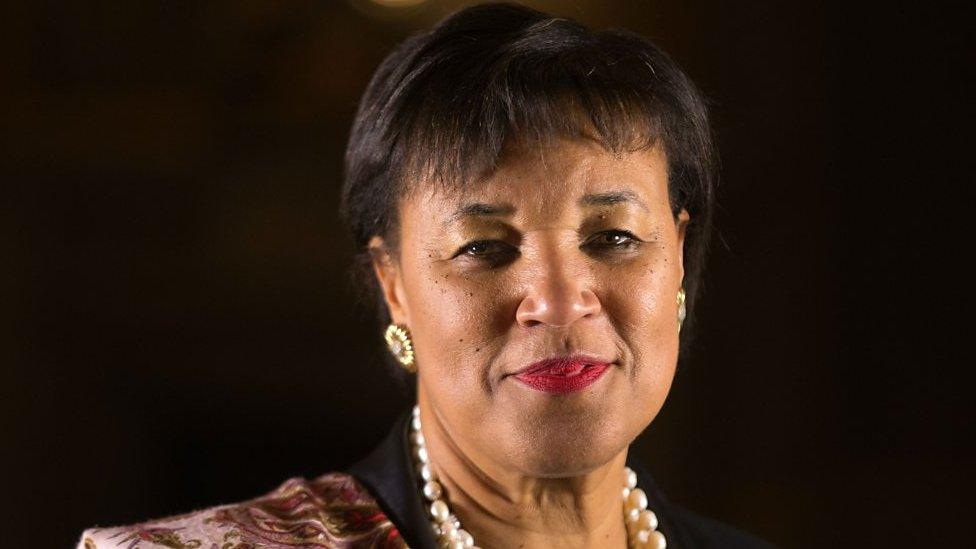Commonwealth leaders reject automatic second term for Baroness Scotland
- Published

Baroness Scotland is head of the Commonwealth Secretariat - the organisation's main intergovernmental agency
Commonwealth governments have rejected a fresh attempt to give the organisation's secretary-general Baroness Scotland an automatic second term of office.
In a letter - obtained by the BBC - Boris Johnson says a "significant and diverse number" of heads of government "from across the Commonwealth" opposed the idea of Lady Scotland being reappointed for another four years without facing re-election.
The prime minister - who is the current "chair-in-office" for the Commonwealth - says that he hopes the heads of government can instead agree just to extend Lady Scotland's contract temporarily until they meet next year.
The 54 heads of government had expected to decide Lady Scotland's future at their big biennial summit - known as CHOGM - in Rwanda this month but the meeting was postponed because of the coronavirus pandemic.
A Commonwealth Secretariat spokesman said the proposal for automatic reappointment had been made because of the uncertainty of when CHOGM might take place, probably next year.
Commonwealth governments now have until 22 June to decide whether to extend Lady Scotland's current term until next year. There is a need for haste because Lady Scotland's existing contract expires on 27 June.
This is the second time that Commonwealth heads of government have rejected the automatic reappointment of Lady Scotland. At the end of last year, some supportive member states put forward the proposal but twice as many countries opposed the idea.
In the letter, dated 8 June, Mr Johnson wrote: "As you will recall, I wrote to you on 13 May, in my capacity as Commonwealth chair-in-office, to ask whether there were any objections to the proposal from Her Excellency the Prime Minister of Barbados, subsequently supported by others, that we should reappoint Baroness Scotland as Secretary-General of the Commonwealth for a second four-year term now."
He went on: "In response to my letter, a significant and diverse number of colleagues from across the Commonwealth have communicated that they do not support that proposal, but prefer that the decision on the next substantive secretary-general appointment should be taken at CHOGM, according to our established practice. Therefore I must respectfully confirm that there is no consensus for the immediate reappointment of the secretary-general for a second four-year term."
Instead, Mr Johnson argues for the temporary extension of Lady Scotland's current term, which he says "would follow our established practice, and would also be the option most consistent with the spirit" of the current rules "according to which secretaries-general are to be appointed by us collectively".
A Foreign Office spokesperson said: "We don't comment on private correspondence between Commonwealth member states.
"Decisions on the appointment of secretaries-general are a matter for heads of government.
"In the past, those decisions have been made at CHOGMs.
"We will work with other Commonwealth countries on the process of appointing a secretary-general for the next four-year term."
'Usual convention'
A Commonwealth spokesperson said: "The reappointment process for Commonwealth Secretary General's occurs when leaders gather for the biennial Commonwealth Heads of Government Meeting (CHOGM).
"The secretary-general, Baroness Scotland, came into post on 1 April 2016 for a term of four years.
"The usual convention is that an incumbent seeking a second term in office is elected unopposed for his or her second term.
"The secretary-general, Baroness Scotland has been supported to serve a second term by Dominica, her country of birth.
The statement went on: "Commonwealth member states agreed to extend the current secretary-general's contract in order to consider the reappointment at CHOGM in Rwanda in June 2020.
"However, CHOGM has been postponed of due to the Covid-19 pandemic.
"A member state wrote to the chair in office to request that Heads of Government consider reappointment now due to the uncertainty of when CHOGM will be able to take place due to the unprecedented Covid-19 pandemic.
"The chair in office wrote to member states on 8 June 2020 to state that consensus was not reached for reappointment to occur now in the absence of CHOGM.
"Therefore, the chair in office has proposed that, as is customary, the reappointment process will now take place when CHOGM is able to meet.''
Earlier this year the British government suspended its funding of the Commonwealth Secretariat, the body that runs the international organisation from London.
UK diplomats told Lady Scotland that Britain's annual £4.7m voluntary contribution would be withheld until her secretariat improved its financial procedures.
The secretariat insisted it was implementing recommendations made by external auditors.
The UK decision came after Lady Scotland was criticised by auditors for "circumventing" usual competitive tendering rules when she awarded a lucrative consultancy contract to a company run by a friend.
The auditors also discovered that procurement rules had been waived by the secretariat on no fewer than 50 occasions over three years.
- Published6 February 2020

- Published30 January 2020
